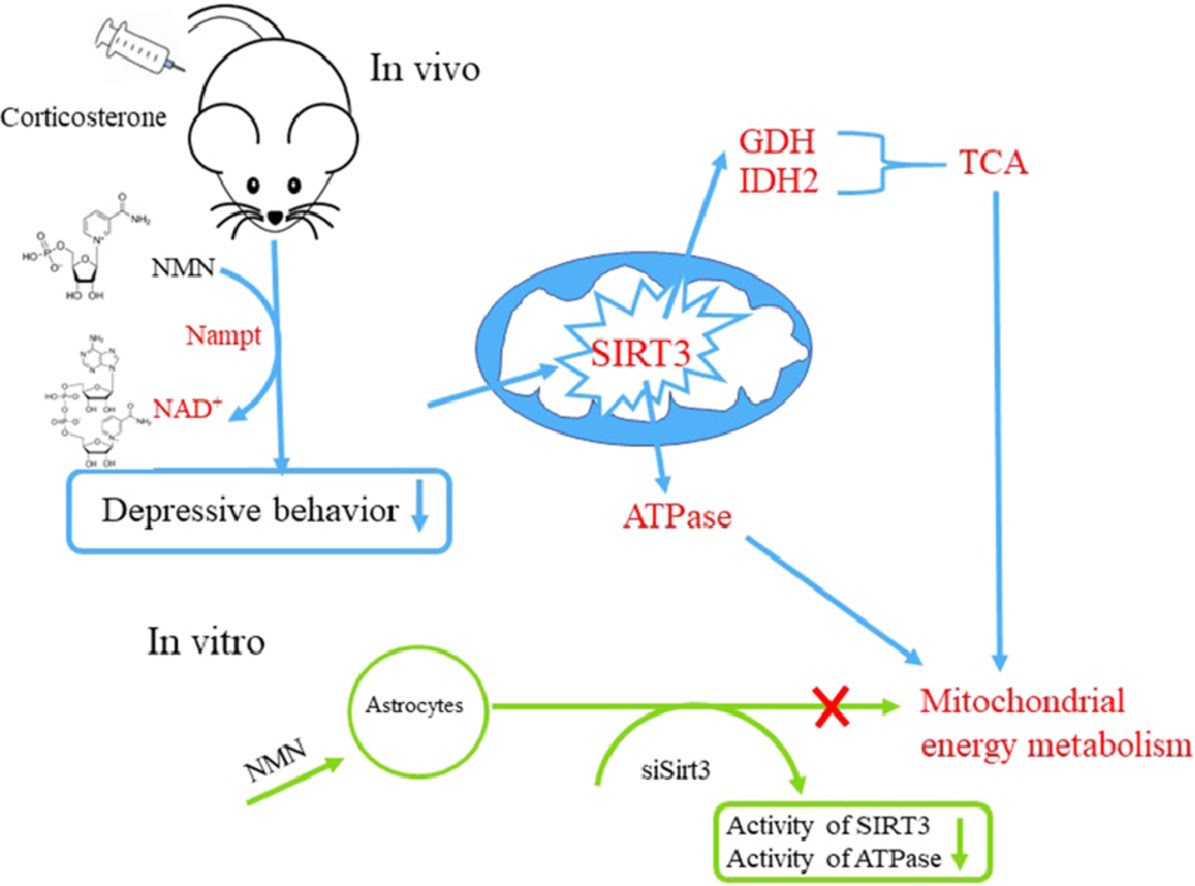Research Reveals NMN Improves Depression in Mice
Scientists find NMN improves depression-like behavior, displayed as immobility in swim tests, and cellular energy production in mice.
About 16.2 million US adults, about 7% of the population, had at least one major depressive episode in the year 2016, according to the National Institute of Mental Health (NIMH). Although doctors can prescribe antidepressant medications to treat depression, about two-thirds of people with depression don’t respond to initial treatments. About 15%-40% do not respond after multiple treatments, either.
A team of scientists from the Zhejiang University of Technology in Hangzhou, China, published a study in the Journal of Affective Disorders describing the beneficial effects of nicotinamide mononucleotide (NMN) on alleviating symptoms of depression in mice. Xie and colleagues found that NMN injections increased levels of a molecule important for energy production in the body, nicotinamide adenine dinucleotide (NAD+). Increasing NAD+ levels with NMN also improved energy metabolism in the brain and liver.
“These results provide evidence for the beneficial role of NMN in energy production and suggest that therapeutic strategies that increase the level of NMN can be an effective treatment for depression,” concluded Xie and colleagues.
NMN ameliorates depression-like behaviors in depressed mice
To study the interplay between NMN and depression, the researchers induced depression by injecting mice with a stress hormone, corticosterone. Following four weeks of stress hormone injections, the researchers added NMN to the injections for two weeks.
When Xie and colleagues evaluated the behavioral capabilities of these mice, they found that the mice treated with NMN exhibited less depressive-like behavior than those that went untreated. To measure depressive-like behavior, they used a method called the “forced swim test.” Mice will naturally swim, so this exam can quantify how long mice will try to stay afloat. Healthy mice will typically stay afloat and not give up, while “depressed” mice give up swimming sooner.
What Xie and colleagues found was that mice that received NMN in addition to corticosterone started to swim longer to survive in the tank compared to those that received corticosterone only or went completely untreated. These results show that NMN was able to mitigate depressive-like behavior in mice.

NMN attenuates mitochondrial dysfunction in depressed mice
Past studies have found decreased production of the body’s energy molecule adenosine triphosphate (ATP) in patients with major depressive disorder. This reduced ATP generation could stem from dysfunction of the cell’s powerhouse, the mitochondria, leading to correlations with depression.
Promoting mitochondrial function may be an intervention for improving depression-like behaviors. As a crucial molecule to keep the energy manufacturing line running, boosting NAD+ with precursors molecules like NMN should promote mitochondrial function.
The Zhejiang University of Technology research team saw that corticosterone-induced depression reduced NAD+ levels in the brains of mice, but NAD+ levels were restored with NMN treatment. What’s more, they found that that NMN injections enhanced mitochondrial energy production in the brain. They think this is linked to the reversal of depressive-like behaviors with NMN treatment.
Xie and colleagues also looked at the activity of proteins that regulate cellular energy production and depend on healthy levels of NAD+ for their function. They examined a protein critical for regulating mitochondrial health called SIRT3. With the induction of depression, levels of SIRT3 dissipated, which could be recovered to normal levels upon NMN treatment.

“Our findings indicate that NMN supplementation can effectively enhance SIRT3 activity to improve mitochondrial energy metabolism in the hippocampus and liver, thereby mitigating [corticosterone]-induced depression-like behavior in mice,” stated the researchers in their study.
Next steps to study NMN and depression
The scientists noted that the small sample size may be a limitation of the study. They call for future studies with larger sample sizes and long-term studies to further investigate the mechanism of NMN on depression-like behaviors. Also, only a single dose of NMN was used in these experiments, so it is important to examine a more comprehensive NMN treatment regimen.
These preclinical studies, meaning they were performed in animals and not humans, start to pave the way for testing NMN in humans for its efficacy on depression. The work is cut out for researchers to establish the safety and efficacy of NMN treatment in animals with depressive-like behavior to one day move this research into humans.

